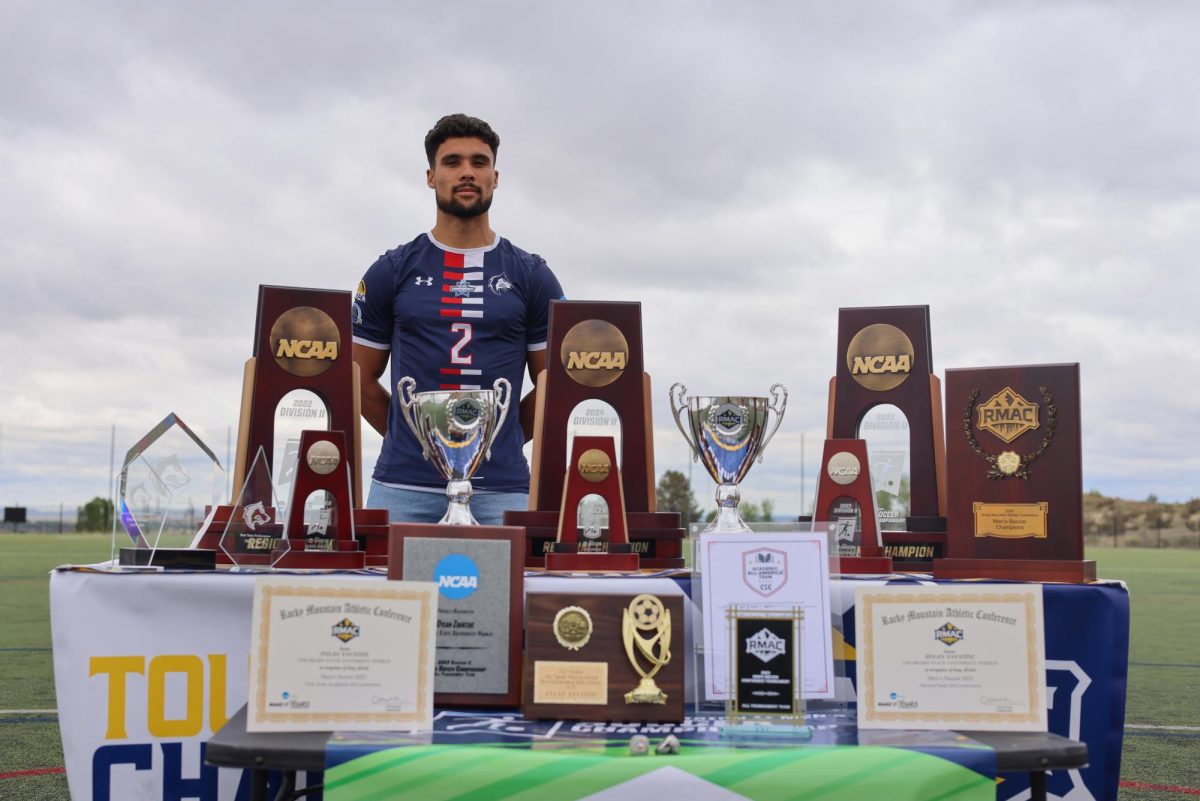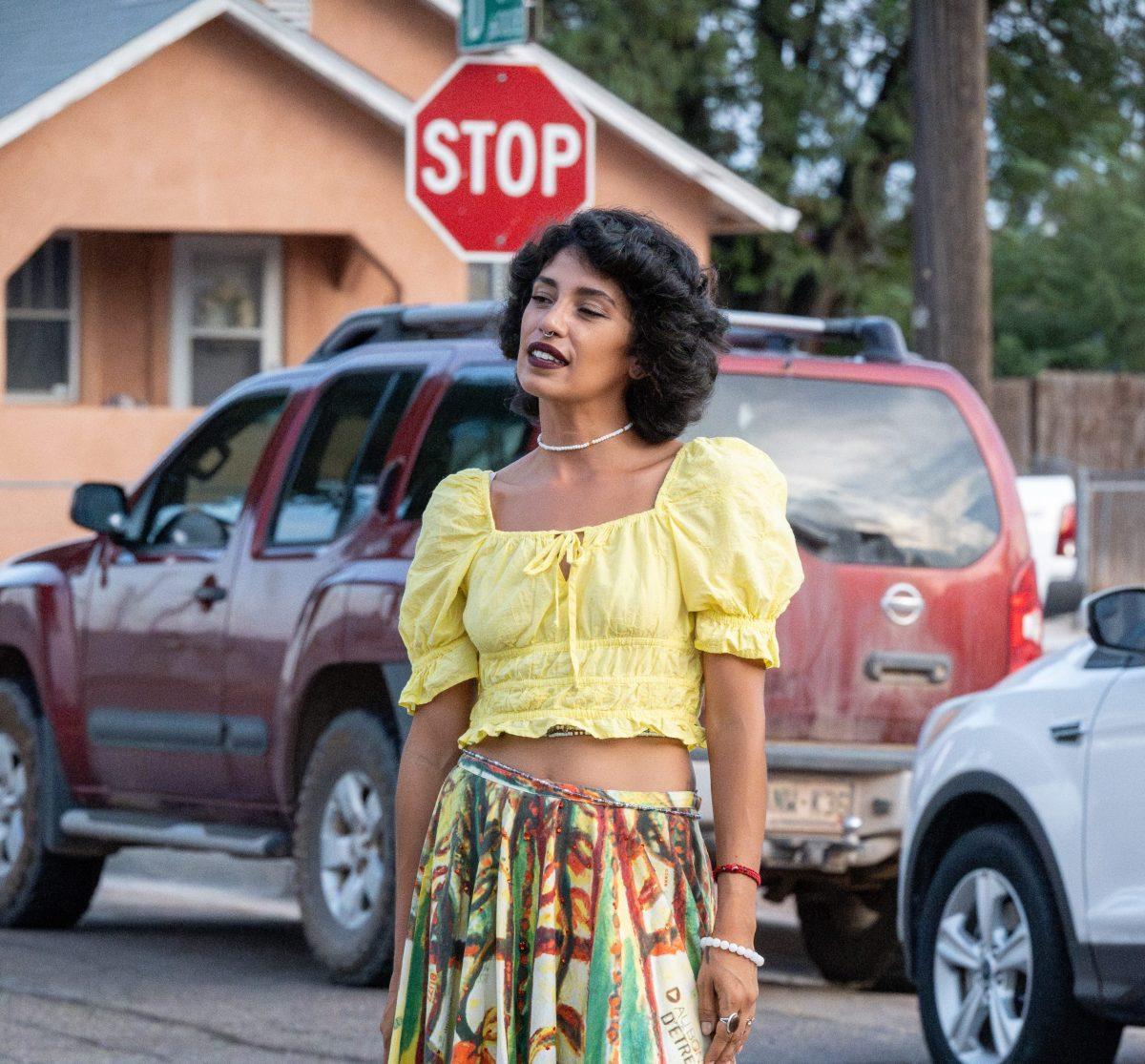Colorado State University-Pueblo student Joseph Parada has experienced a lifetime’s worth of impactful events and is now expressing his experiences and emotions through the years into his art.

Parada, 73, has an entire corner of the Fine Arts Gallery devoted to his distinct artwork, including numerous paintings, a piece of woodwork and a children’s book that was written and drawn by the artist.
Born in the country of Chile, Parada’s voyage to the United States alone was something to behold, as he took several different directions until one eventually led stateside. Son of a military man, he learned unique life-lessons that would prove valuable to him later in his own armed forces experiences.
Something also passed down to Parada was an idea of what makes artists tick as his father played the trumpet and even performed in his own band.
“Artists’ brains are wired differently. They are bohemian,” Parada said of artists’ mentality.
As a youth in Chile, he was pushed to learn artistry similar to his father, mainly focusing on the piano. Parada spoke of his love for dancing and how it would forever be a part of his life, even coming out through his painting.
As he grew up, Parada started on his own personal path by joining the Chilean Air Force while still a teenager and earning the first notch in what would become an extensive military career.
It was here that Parada began to travel the world. He traveled to parts of Europe foremost with Germany being the most common destination. Through all this time, he made sure to take advantage of the various learning opportunities provided by the Armed Forces, taking classes as much as possible.

Ultimately he began working on a large ship during the 1960s and saved his money, focusing on the goal of reaching the U.S. Parada worked on the ocean for two straight years from 1965 to 1967 before finally having enough money to reach America, first living in Baltimore then New York.
Despite the strangeness of late-60s New York, Parada said that there was no real culture shock.
“When you travel the world you learn that the people are very different,” he said.
Despite that, Parada still had to adjust to life in a new situation, eventually finding comfort in the books of Napoleon Hill.
His life of military duty was not over however as Parada joined the U.S. military, once again engaging in a life of travel and danger.
“The Vietnam War was happening. I thought ‘take me to Vietnam, take me to active duty!’ and I will serve if it is what I have to do,” he said, though he never saw active duty as the war had slowed down by the time he had joined.
Eventually retiring from the Armed Forces, Parada’s new direction in life led him back to his deep-rooted love of the arts and looked to find his voice through school. With his family having gone to school in Colorado, he began to look at his own opportunities and found himself at Pikes Peak Community College.
“My professor there told me ‘Joseph you are really good!’ He really empowered me, made me feel motivated,” Parada said, adding that his professor implored he attend a four year university to further learn his craft.
Now at CSU-Pueblo, he began to realize his own potential as well as what inspired him to create, with numerous life moments and passions to draw inspiration from.
A theme very dear to the artist is the representation of veterans. Two of Parada’s paintings featured at the Fine Arts Gallery are tributes to veterans around the world.
“Veterans want respect, not pity,” he said, explaining how they can often be abandoned or forgotten.
Other persistent themes in his work are landscapes and the beauty of nature.
“(Colorado) Springs and the Rocky Mountains remind me a lot of the Andes,” he spoke, relating the Colorado signature with the Chilean mountain range.
A piece at the gallery features an amalgamation of the two areas, titled “A Touch of Nature.”
The last huge inspiration to the artist is a prevalent one in most people’s lives: his family. Parada relayed a story about a chihuahua dog he adopted from his daughter when she moved to Texas and couldn’t take the dog, named Rocky, with her.
“I never liked little dogs, they reminded me of little rats,” he said.
Despite this, he took in the dog and the two began to connect, with Parada calling him a great friend.
“I took him all around the world with me,” he claimed, adding that the dog was very macho, even married twice. Rocky died in 2009.
Parada paid tribute to his beloved friend in the form of a children’s book title “Wonder Dog and the Old Man,” a story about a small dog finding a home. Parada can also be seen with Rocky in the picture “Winter Walking,” where the two are seen traversing a snowy forest.
The veteran spoke nicely of the art program at CSU-Pueblo, expressing praise for professor’s allowing the artists to find themselves and feel their way through their art.
“I would take my art to one professor and they would go bananas, asking ‘what is that?’ but then I’d take it to another and they’d go bananas for the opposite reason,” Parada said.
Parada has achieved quite a bit in his time, not only in the confines of CSU-Pueblo, but across the globe. Now at an older age, he says that working on his art has made feel “like a kid again,” igniting the passion of a man who has contributed so much to the world.
Parada’s art is available to see at the Fine Arts Gallery through the rest of the spring semester.







![A firefighter stands in the smoke of the June 3 Lake Minnequa Fire while a firefighting helicopter passes overhead. [Today photo/file/Kimmy Reinhardt]](https://socostudentmedia.com/wp-content/uploads/2022/06/284636131_2489009947902060_3475629797326615982_n-scaled-1-1200x900.jpg)
![FFA delegates line the stage at the Massari Arena June 9. [Today photo/Cassime Joseph]](https://socostudentmedia.com/wp-content/uploads/2022/06/Untitled-2.png)
![The Posada of Pueblo staff is a small-but-mighty team of women leaders who work for the city's most vulnerable members. [Today photos/Brianna Sammons]](https://socostudentmedia.com/wp-content/uploads/2022/03/IMG_6710-scaled-1-1200x800.jpg)